
Articles by Nigeria

Collaborating with public health providers in Nigeria
"I feel satisfied as a service provider and as a member of the outreach team." Shodunke Mary, 53, has been a midwife from the Local Government Area Council for seven years. Now she is working with PPFN providing family planning counselling and a range of integrated sexual and reproductive health services. In addition, Mary also conducts on the job training to other facilities which are providing services for the PPFN model. "The model used by PPFN is successful because the services we provide are free for those in need, the providers are motivated and the community leaders are also involved in the implementation. Also, the commodities and equipment are always available." As seen above, Mary administers an implant to Bukola Akami, who has one baby. The number of new contraceptive users has dramatically increased by 400,000 in less than a year as a result of PPFN's outreach and service delivery. Yetunde, 26, like Bukola, is a client with a young baby and was also seeking family planning. She says: "I don't want to have another baby in the next three years. I have a lot of things I want to do and I want to have time to take care of my children. My baby is really affecting my work and I always have to leave her with my mother-in-law. I will be recommending PPFN's family planning to my friends so they can also know what to do when they don't want to get pregnant again." The team Read more about the team behind Nigeria's amazing success
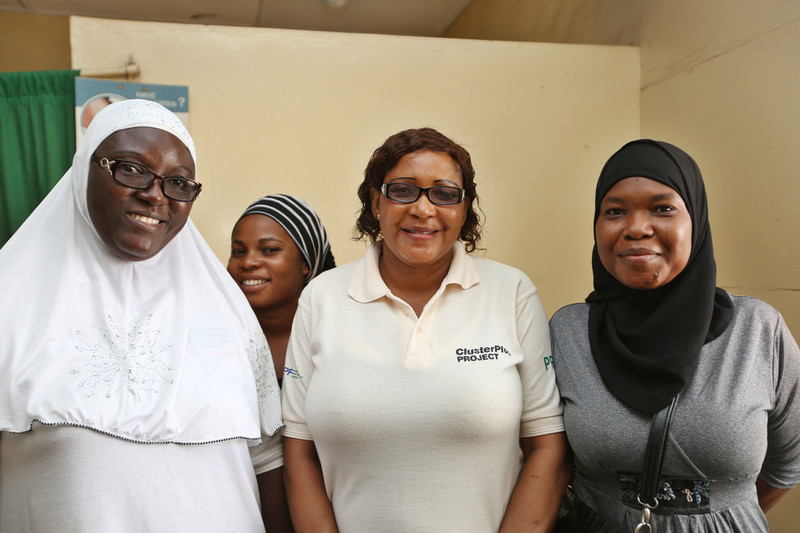
Providing more than just one service to the community
"As a child I loved the medical profession so much. I always wanted to go with my aunt to the hospital for her antenatal check-ups. The neat and well-tailored uniform of the health workers always caught my eyes. And I knew one day, I would be wearing one of those uniforms serving my community.” Latifat Balogun explains how her childhood experiences led her to decide to train and work as a Community Health Extension Worker with the Planned Parenthood Federation of Nigeria (PPFN), where she has worked for 20 years. She plays an integral part in delivering a wide range of services to women in her community. Here she is about to treat Zainab Akinsola, 52-years-old, who is waiting to have cervical cancer screening during a PPFN outreach programme at the Eni Ayo clinic in Ibadan, South West Nigeria. As a result of the strong integrated service delivery, non-contraceptive services increased from 42,700 in 2014 to 226,000 in 2015. Latifat's colleague, Adeyinka, is a faith-based health worker who encouraged a friend to undergo cervical cancer screening. "I counselled her and she went for screening, not knowing that she was going to test positive. If it wasn't for PPFN she might have died of cancer. I so nearly lost a friend. So I cannot forget that day. But now my friend is bouncing up and down, so excited about the project! During our last outreach she brought so many people." The team Read more about the team behind Nigeria's amazing success
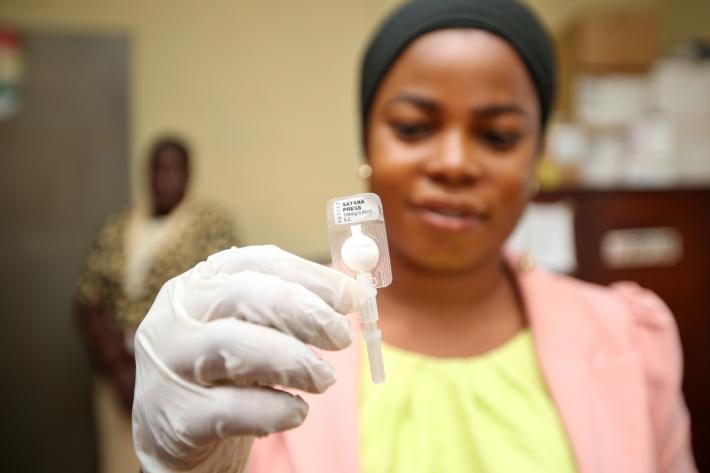
Sayana Press: Finding the right contraception
"How do I feel about my role? I'm excited!" Emiade Kudirat, 24, is a Community Health Extension Worker doing outreach with the Planned Parenthood Federation of Nigeria (PPFN) for the last 18 months. She specializes in the Sayana Press - a three-month, progestin-only injectable contraceptive favoured for its convenience in administration and portability. "I go from house-to-house to provide health education and introduce family planning services. I do counselling and provision of these services too. The PPFN model can really reduce the mortality rate of women in the community. We're taking the clinic to women at the market, to their homes and to their work." One patient, 24-year-old Bukola Polpoola, says she is happy that her treatment was free and easy. "In my village we don’t have any information about this. At first I was afraid it would stop me from getting pregnant again. I’d heard stories of side effects. I’m a nurse and even I began to wonder about it. But I called the clinic and they counselled me and reassured me.” She talked to her partner before she decided to get an implant. Now, she says, she’d recommend it to anyone. "I would be happy to spread the word in my village. Taking this will help you plan your life. For example, you know that for the next two years you can’t get pregnant and you’ll be able to plan your life properly because an unwanted pregnancy can stop you from getting an education or a job. This removes that fear for a time." The team Read more about the team behind Nigeria's amazing success
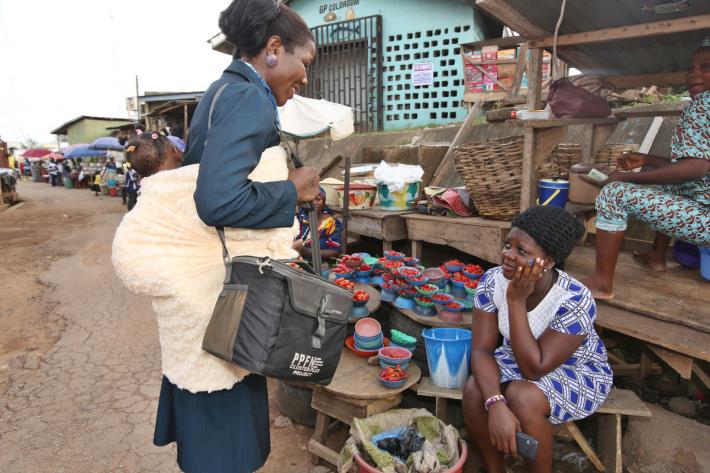
Nigeria's Cluster Plus model: Working in the community
"I find this work very interesting. I love to interact with the women in the markets. And I get to work all day with my 10-month-old baby, Bejide, with me!" Olusula, 40, is a Community Health Extension Worker, conducting outreach for the Planned Parenthood Federation of Nigeria (PPFN). In 2014, PPFN received a one year grant from the Bill & Melinda Gates Foundation through IPPF. The purpose of the grant was to expand family planning and reproductive health services. PPFN used this grant to improve on its current model of service delivery known as the Cluster model. PPFN piloted a successful project over 9 months around family planning. This project exceeded targets significantly and has the potential to be rolled out in Nigeria and other countries. "I refer clients through vouchers to the facility of their choice for long acting and reversible contraceptive methods too", explains Olusula. She works closely with her local community providing information and choice about contraceptive methods. Women and men are able to make informed decisions that ensure suitability to them and their circumstances. Choice promotes convenience and acceptability. "This PPFN outreach and service model will reduce a lot of abortions in our community. It also encourages women to space their children and lets them do the other things they want." The team Read more about the team behind Nigeria's amazing success
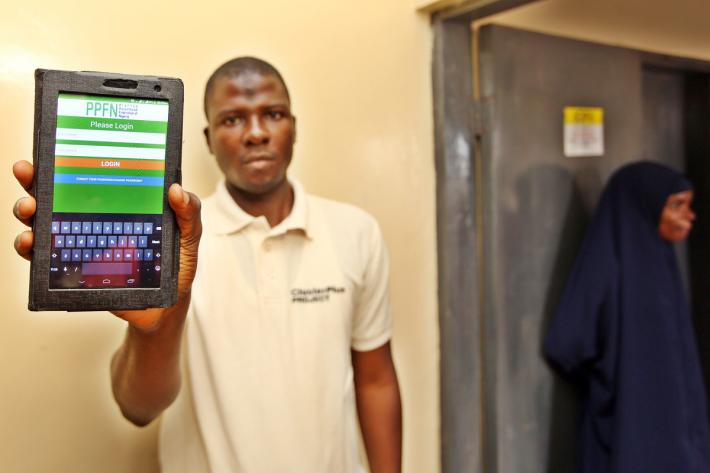
Preventing stock-outs and ensuring people can get the contraception they want
"We capture the data directly into this app. It maps out what the demand will be and ensures that we never run out of those supplies.” Monitoring and evaluation officer, Babatunde, is responsible for ensuring the supply of contraceptives for all the cluster facilities. "My job entails the use of a mobile app built for direct data information capture (DDIC). I created an account for each of the 10 facilities that were under the Clusterplus Model. Before I stock up their store, I audit their supplies and can review their monthly report via the app. I put this into the mobile app as well as the commodities I have supplied them. Every two months, the app will forecast what a particular facility will need based on the contraceptive demand.” "I provided training on the mobile app for the store keepers at the facilities we worked with. All through the nine months of the Clusterplus Project, no facility ever ran out. This meant family planning methods were always available to those that needed them.” Babatunde has developed a wealth of knowledge about family planning and the many methods available. Clients favour long-acting methods Implanol and the IUCD. Two of Babatunde's colleagues Afolabi and Olufemi tell us they have both had some very memorable experiences during their careers as Community Health Extension Workers. Afolabi, 32, says the crux of her work is in breaking down the meaning of family planning to rural communities. "I discovered lots of misconception and misinformation, fears and rumors about family planning. But my job is to educate them on the benefits of family planning and allay their fears. We keep educating them and breaking down the 'walls' they have built around family planning methods, like the false thinking that implants require an operation." "I so much look forward to the outreach sessions. It is a time to help women make better choices that will help them plan for their family and future. The fact that the family planning method is administered free has contributed to its high level of acceptance by the people." "In some of our communities, the people are so poor that they can't feed themselves properly. Let alone to have money for family planning. Poverty is real and not planning your family, escalates the challenges of having a poor quality of life. No money should mean fewer children. But the reverse is the case and poverty goes together with low level of education." Olufemi agrees. "I counselled a woman who I thought was 50-years-old. But I was surprised to find out she was just 29-years-old and had 12 children. The burden and labour of delivering 12 children could be seen all over her". "It was a pathetic case for me. I imagined, how can a 29-year-old have 12 children? We spoke about the different family planning methods available. She decided to have a long term method that will last for five years. "Months later, she called me to thank me. I was so happy knowing that she appreciated it. Because I wondered, how will she raise all those children without a good livelihood? I was glad to have contributed to helping her plan her family." The team Read more about the team behind Nigeria's amazing success
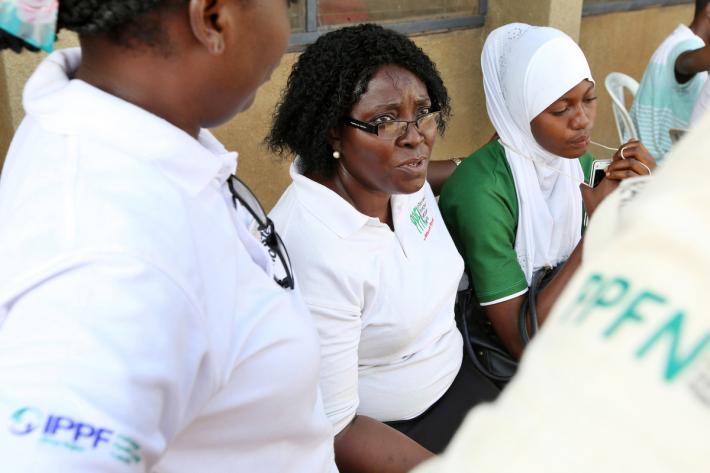
Creating a one-stop shop of services in Nigeria
"We saw changes, broke barriers, removed myths. My joy will be to see this approach rolled out across the country. I am to be helping and empowering women in our rural communities to make informed choices about their health." Ambibola is a programme officer for IPPF's Member Association in Nigeria, working on the ambitious Cluster Plus model. “The project was a one-stop shop which brought services together. So a woman could have screening for breast and cervical cancer, counselling and have access to all methods of family planning at the same place. Also if a woman was detected with early stage of cervical cancer, we were able to carry out a curative operation." "Our success is due to our grassroots approach. We asked the communities to nominate the community health workers they would like to work with. These workers go into the community to counsel people about their health issues. This gave the communities a sense of ownership and kept them fully engaged.” "We also held meetings with traditional and religious leaders who then went into the community to tell people about our projects. Now many private centres want to adopt our approach. In these communities the rate of teenage and unwanted pregnancies has gone down, maternal and abortion mortality has also been cut. We were able to take family planning to the doorsteps of the women in our rural communities the ones who needed family planning but couldn't afford it." The team Read more about the team behind Nigeria's amazing success
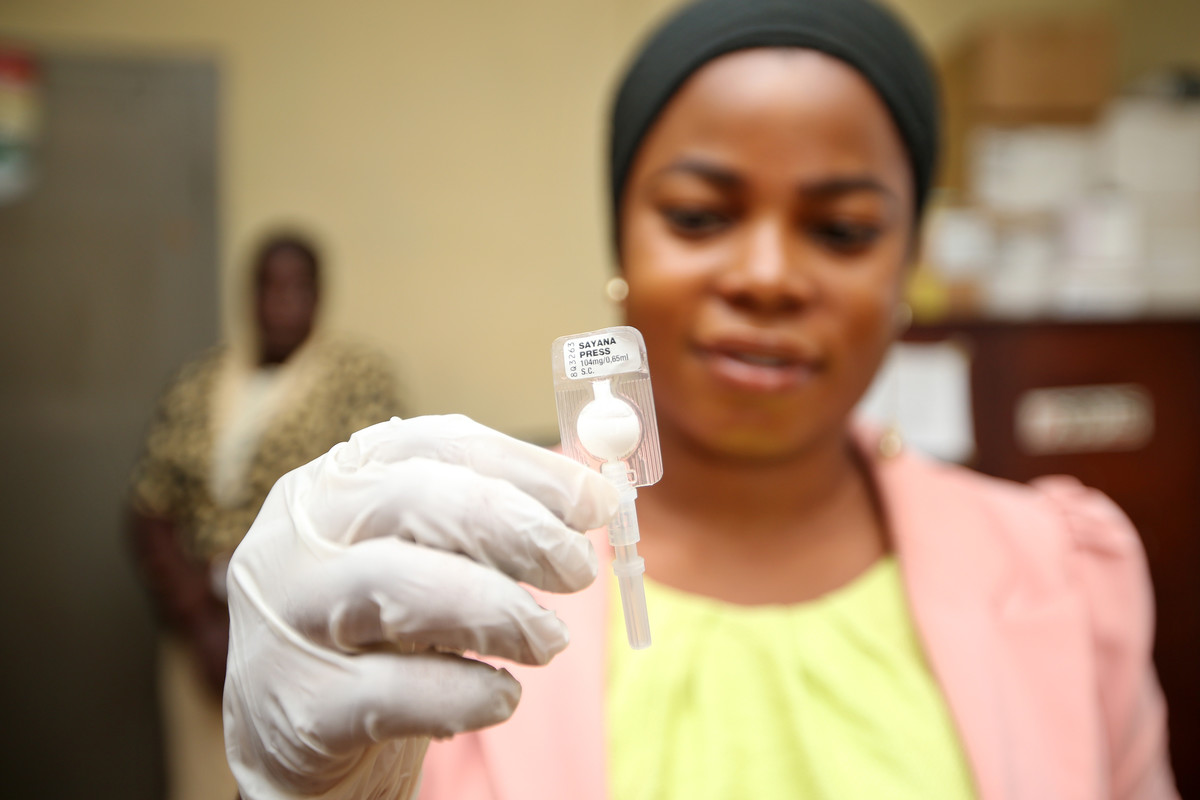
Sayana efforts will help widen contraceptive choice for world’s poorest and neglected women says IPPF
Expanding contraceptive choices offers the potential to put power into women’s hands said the International Planned Parenthood Federation (IPPF) in reaction to the Sayana Press announcement by Pfizer BD, and the Bill and Melinda Gates Foundation, and CIFF today. IPPF is already playing a major role in the introduction of Sayana Press to increase access to the world’s most poorest and underserved women and girls. Sayana Press is offered as part of the contraceptive mix by IPPF’s Member Associations in Uganda, Nigeria, Burkina Faso and Senegal. They are doing this by providing Sayana Press at our extensive network of clinics, and by training community volunteers and government staff to give women Sayana Press in their own communities. Tewodros Melesse, Director General IPPF said; “This announcement is a great opportunity to enable women and girls who are often left behind because they are poor, unable to make decisions because of their partners, too far from a clinic or disabled to access contraception. Sayana Press has the potential to reach those who have never been able to access family planning before. We have seen that Sayana Press is popular with women in remote communities who can’t easily get to a clinic or drug shop. We are keen to see countries move towards community based distribution and ultimately, self-injections. All efforts must truly reach the last mile. Enabling women to administer in their own time and wherever they are is the only way to put power truly into women’s hands. It is a great step in helping to tackle the needs of the most poorest or neglected women and girls. But like any contraceptive, it must be offered as part of a broader mix of methods available and not favored more than others. Choice means every women and girl has the right to choose about their contraception wherever and whoever they are.” IPPF launched its annual global I Decide Campaign on family planning today. IPPF is fighting for a world where women everywhere can say "I decide". Support our call for universal access to contraception! Add your voice
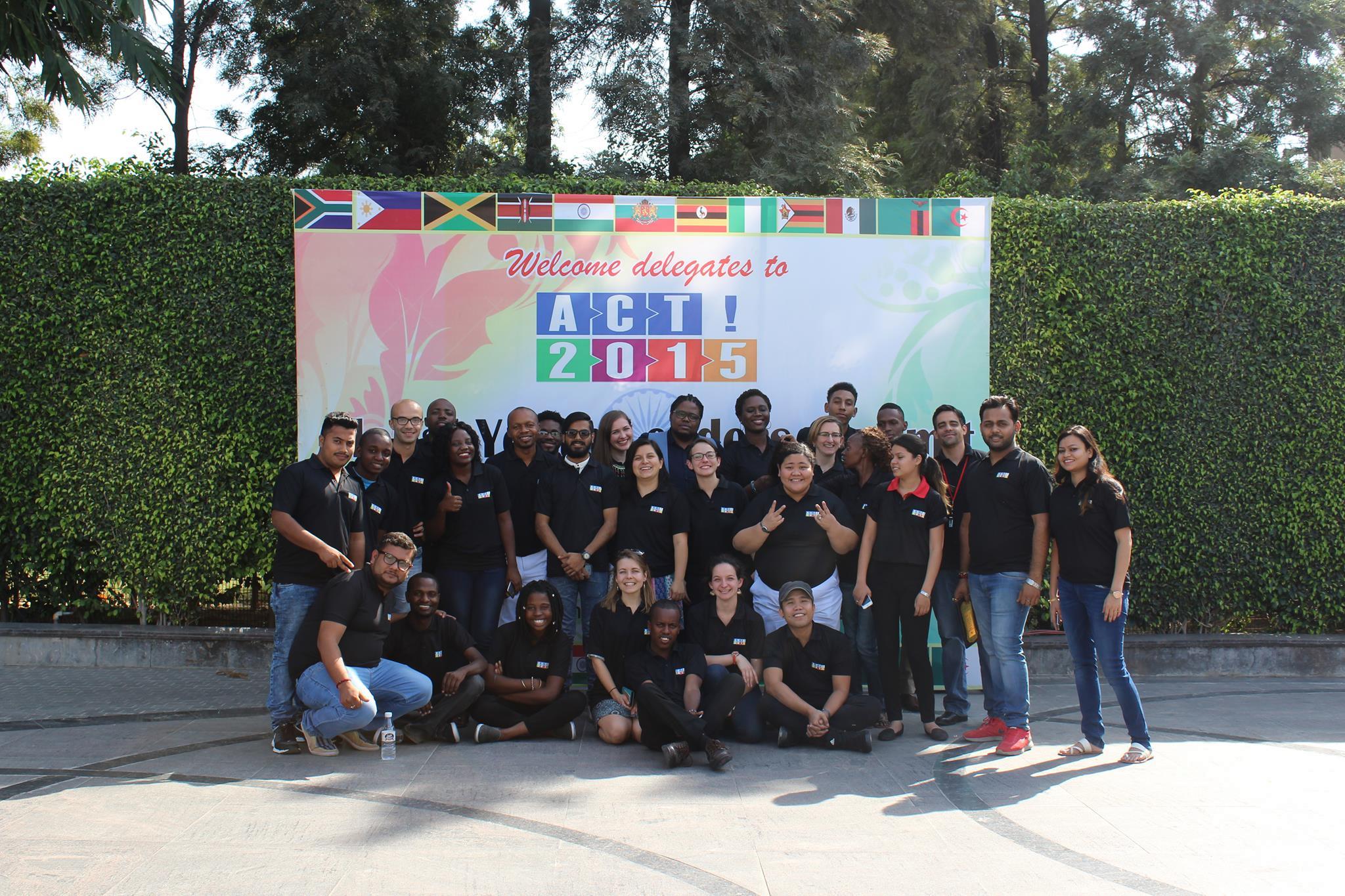
ACT!2030
IPPF collaborates with UNAIDS and The PACT to implement ACT!2030 (formerly ACT!2015), a youth-led social action initiative which engages young people in 12 countries with advocacy and accountability around the Sustainable Development Goals (SDGs) and other SRHR agreements/frameworks. ACT!2030 was initiated in 2013 as a way to increase youth participation in the negotiations leading up to the adoption of the post-2015 development agenda, and for two years focused on establishing alliances of youth-led and youth-serving organisations in 12 countries across the world. The project is currently in Phase 4, which runs until the end of 2017, and aims to establish youth-led, data-driven accountability mechanisms to ensure youth engagement with the implementation of the SDGs and build an evidence base for advocacy. Ultimately, Phase 4 of ACT!2030 seeks to identify, assess and address key policy barriers to young people’s sexual and reproductive data by using existing data, supplemented by youth-collected data, to advocate and lobby for policy change. This phase involves four main activities: indicator advocacy (persuading decision makers to adopt youth-friendly SRHR and HIV indicators, including on things like comprehensive sexuality education (CSE) and access to youth-friendly services, into national/global reporting mechanisms); evidence gathering (creating national databases on quality of and access to youth-friendly services and CSE); communications (transforming this data and evidence into communications pieces that can be used to advocacy and lobby at national and international level); and global exchange (facilitating global visibility to share advocacy and engagement learnings and increase youth-led accountability in global and regional processes). ACT!2030 is implemented by national alliances of youth organisations in 12 countries: Algeria, Bulgaria, India, Jamaica, Kenya, Mexico, Nigeria, Philippines, South Africa, Uganda, Zambia and Zimbabwe.

Changing lives in Nigeria
Nigeria has Africa’s biggest population. And it’s still growing at 3% a year. A lack of family planning is one reason – many women and girls want contraception – but like millions around the world – can’t get it. But that could be about to change, thanks to a pilot project run by Planned Parenthood Federation of Nigeria (PPFN), IPPF’s national member. It’s proving a huge success. This is its story, told by the women whose lives it has changed and the people working to change them. LAUNCH THE INTERACTIVE STORY
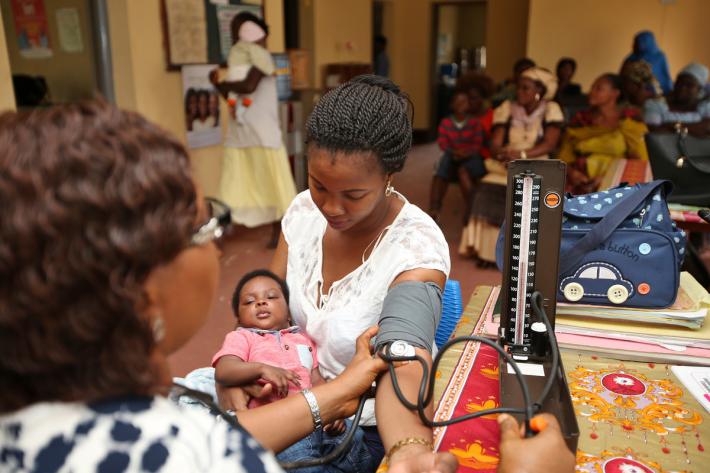
A Nigerian mother's renewed faith in family planning
"I decided to use this clinic because I heard a lot of success stories about it. I trust their judgment that is why I am here.” Taiwo Ogunfayo, a 33-year-old interior decorator, is a client at the Liberty Stadium Clinic – one of Planned Parenthood Federation of Nigeria (PPFN) facilities in Ibadan, the Oyo State capital in South West Nigeria. “One day, I was in the market when I came across a PPFN outreach. The way the Community Health Extension Workers were explaining the different family planning methods was very simple to understand. “I have come across a lot of women since my first visit to this place and they all assured me that family planning works and it won't fail like a previous experience, but I didn't let that stop me from trying family planning again." Lack of adequate information is creating misinformation and wrong perceptions about family planning. She says that 'a lot of women have all sorts of beliefs about family planning, tied to religion and culture', hence the need for more PPFN community outreach services. "It was through the outreach service in my community that I found out about PPFN. The interesting thing about the Planned Parenthood Federation of Nigeria project in Oyo state is that all the family planning methods are free if you can't afford to pay. There is no cost to the patient." The team Read more about the team behind Nigeria's amazing success
Pagination
- Page 1
- Next page







